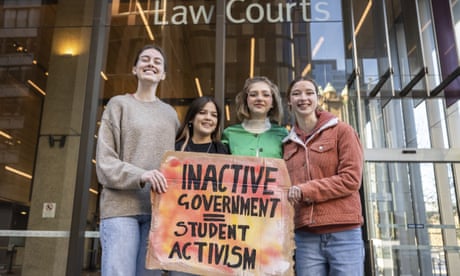- by foxnews
- 10 Mar 2025
‘I’m tired of the lies’: the young activists leading the way on climate action
‘I’m tired of the lies’: the young activists leading the way on climate action
- by theguardian
- 03 Oct 2022
- in news

Sometimes it takes the clarity of youth to capture a moment.
Izzy Raj-Seppings had that clarity when she stood her ground outside the Australian prime minister's residence despite being ordered to move by riot police.
She was part of a small group protesting against then prime minister Scott Morrison's inaction on the climate crisis as the country endured unprecedented bushfires across the south-east.
A photo of 13-year-old Izzy, tears running down her face, as a police officer told her to move, catapulted her to the forefront of an emerging generation being failed by its leaders and public institutions.
It wasn't planned this way - it was just the second time Izzy had been to a protest. But her moment of defiance chimed with a rising global youth movement, much of it inspired by Greta Thunberg's School Strike 4 Climate protests.
The Guardian has given a platform to these campaigners as the movement, often led by articulate and authoritative young women, has evolved and expanded. In a piece written between school commitments, Izzy summed up the attitude towards the political class: "Their denial has gone on for far too long. I'm tired, tired of the lies and misdirection. I'm tired of watching my future, my friends' and family's futures, all of our futures, burn before our very eyes."
Miranda Whelehan, a campaigner with the activist group Just Stop Oil, expressed similar sentiments in April after she was ridiculed by a presenter on British morning television in a scene that could have come straight out of the satirical film Don't Look Up.
Whelehan told the Guardian she understood why people thought there were parallels between her experience and that of the film's characters played by Leonardo DiCaprio and Jennifer Lawrence. Both suffered through interviews with presenters that "think they know better than chief scientists or academics who have been studying the climate crisis for decades, and they refuse to hear otherwise".
"It is wilful blindness and it is going to kill us," Whelehan wrote. "We will not continue as generations have before and allow our actions today to have devastating consequences on those tomorrow. It is time to break that cycle and stand up for what is right."
Different activists are treading different paths to try to achieve this. For 19-year-old Bella Lack, a campaigner turned climate author, standing up for what is right was achieved by finding young people across the planet who were working to make changes in their communities that help improve the world and may inspire others.
The stories Lack collected became a book, The Children of the Anthropocene. They include a hunger strike by a pair of sisters that persuaded the governor of Bali to ban plastic bags and a campaign by a young Mumbai lawyer that led to a community campaign to clean up thousands of tonnes of plastic washed up on a beach.
Lack told the Observer that rather than tell people abstract stories of destruction that were hard to relate to, she believed the way to bring about change was to share stories that align with an old environmental campaigning adage: think global, act local. The goal was to "try to get people to engage emotionally with what's happening".
Vanessa Nakate's struggle is to try to ensure Africa gets its fair share of global attention. Africa is responsible for less than 4% of global emissions but is disproportionately at risk from the climate crisis. Interviewed by the Guardian last December, Nakate, 25, discussed being cropped out of an Associated Press photograph of young activists at the 2020 World Economic Forum in Davos.
As the only non-white campaigner in the picture, it was her omission that illustrated her point. "The erasure of our voices is literally the erasure of our histories and what people hold dear to their lives," she said in another recent interview.
Nakate's argument was straightforward. If talk about the climate crisis does not include African activists, it will exacerbate and compound existing injustices. "It's important to recognise that the climate crisis was caused by the global north and it is the global south that is suffering. This creates a huge responsibility that lies with the global north to take action, to give climate justice, especially for communities on the frontlines," she said.
The Guardian continues to follow youth activism as it moves into a new phase in which the crisis is no longer a problem of the future, but a very real present-day phenomenon.
For Raj-Seppings, now 16, it has meant joining legal action by eight teenagers against the Australian government that argued it had a legal responsibility to consider the climate impact on future generations before approving a coalmine expansion. A landmark win for the teenagers was later overruled on appeal.
But Raj-Seppings still felt like the campaign had been worthwhile. It did what activism aims to do: build towards change by reshaping the conversation about the government's legal responsibility to deal with the climate crisis. That debate has escalated since the new Labor government was elected in May.
"You can't win it all at once," she said, with clarity, in a recent interview with the Guardian. "You've got to take the small victories and keep pushing."
- by foxnews
- descember 09, 2016
Ancient structure used for cult 'rituals' discovered by archaeologists
A Neolithic Timber Circle was discovered by archeologists in Denmark resembling the historical landmark Stonehenge in the U.K. It is open to be viewed by the public.
read more


